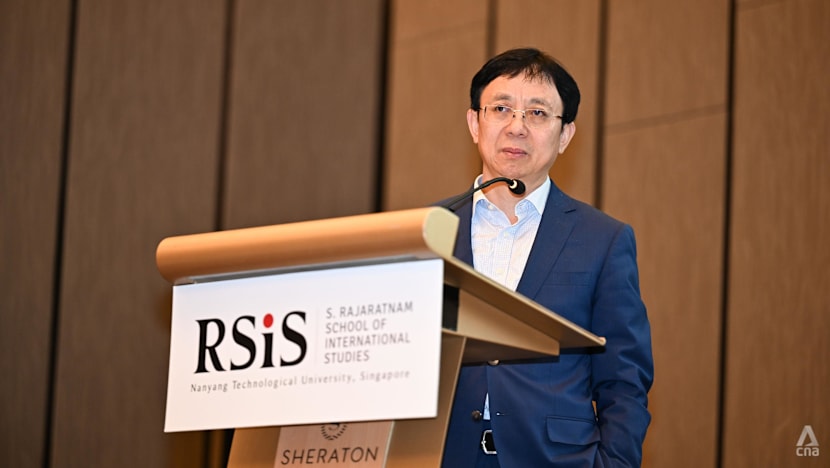World
US-China Relations: Scholar Explores Path to a Grand Bargain

A prominent scholar has outlined the conditions for a potential “grand bargain” between the United States and China, emphasizing the need for Washington to reaffirm its adherence to the one-China policy. According to Wu Xinbo, dean of the Institute of International Studies at Fudan University, such a deal could lead to significant economic and security cooperation, potentially easing tensions around Taiwan.
Wu delivered his insights during a lecture in Singapore on October 9, 2023, hosted by the S Rajaratnam School of International Studies. He argued that if the US were to cease its containment policy towards China, it would foster a more cooperative environment. “If China and the US can strike a grand bargain, it will lead to a future with a blend of cooperation, hedging, and competition among multiple actors,” Wu stated.
The discussion comes as the US and China navigate a complex trade relationship amid ongoing strategic competition. The prospect of a face-to-face meeting between Chinese President Xi Jinping and US President Donald Trump at the Asia-Pacific Economic Cooperation (APEC) summit later this month has raised questions about the feasibility of such an agreement. Despite the growing dialogue, skepticism remains about the likelihood of substantial concessions from both sides.
Historical Context and Future Prospects
Wu highlighted historical precedents in US-China relations, noting agreements made in the 1970s and 1990s that established frameworks for cooperation. The 1972 Shanghai Communique is a key example, where the US recognized the one-China policy, leading to enhanced diplomatic and economic exchanges. Similarly, in the 1990s, the US supported China’s entry into the World Trade Organization, integrating it further into the global economy.
He warned that a failure to establish a new grand bargain could result in a divisive and confrontational landscape reminiscent of the Cold War. “A serious clash would lead to a return to that structure, which serves no one,” he explained. In contrast, Wu expressed optimism that a renewed agreement could create a more stable and secure environment for regional actors.
During the subsequent question-and-answer session, Wu addressed the necessary conditions for a successful grand bargain. He stressed that the US must halt its efforts to contain China and reaffirm the one-China policy. In return, he suggested that China would reciprocate economically by maintaining support for the US dollar and purchasing US federal bonds. Additionally, he indicated that China might adopt a more lenient stance on Taiwan, alleviating tensions surrounding the island, which Beijing considers part of its territory.
Reactions from US Allies and Regional Implications
When asked about the potential reactions from US allies, Wu expressed a belief that they would welcome a grand bargain. He noted that an agreement could alleviate concerns over the US’s military presence in the region and its implications for regional security commitments. US allies like South Korea, Japan, and Australia have been hesitant to increase military spending in line with US directives, preferring to make independent decisions regarding their defense budgets.
Wu also pointed out that a successful Sino-US agreement would likely improve economic engagement for America’s allies with China. Given that China is already a top trading partner for many countries in the region, a grand bargain could incentivize further collaboration.
Addressing the possibility of China shifting towards forming formal alliances in response to US pressure, Wu deemed this “very unlikely.” He acknowledged ongoing debates within China regarding its partnership-centric approach but emphasized that substantive cooperation with countries such as Russia and Pakistan is likely to continue.
In discussing the role of the Association of Southeast Asian Nations (ASEAN) in regional security, Wu acknowledged that while some of its initiatives have been less successful, the bloc still holds significant value. He credited ASEAN with facilitating security interactions among various regional actors, which has been crucial in advancing military cooperation.
Wu concluded by asserting that although the institutions may not have achieved all their goals, they have contributed to a security culture in the region that remains relevant today. He posited that without these frameworks, the regional security landscape could be even more precarious.
-

 Lifestyle4 months ago
Lifestyle4 months agoHumanism Camp Engages 250 Youths in Summer Fest 2025
-

 Business5 months ago
Business5 months agoKenvue Dismisses CEO Thibaut Mongon as Strategic Review Advances
-

 Sports4 months ago
Sports4 months agoDe Minaur Triumphs at Washington Open After Thrilling Comeback
-

 Sports5 months ago
Sports5 months agoTupou and Daugunu Join First Nations Squad for Lions Clash
-

 Top Stories5 months ago
Top Stories5 months agoColombian Senator Miguel Uribe Shows Signs of Recovery After Attack
-

 World5 months ago
World5 months agoASEAN Gears Up for Historic Joint Meeting of Foreign and Economic Ministers
-

 Health4 months ago
Health4 months agoNew Study Challenges Assumptions About Aging and Inflammation
-

 Business5 months ago
Business5 months agoOil Prices Surge Following New EU Sanctions on Russia
-

 Entertainment4 months ago
Entertainment4 months agoDetaşe-Sabah Violin Ensemble Captivates at Gabala Music Festival
-

 Entertainment4 months ago
Entertainment4 months agoBaku Metro Extends Hours for Justin Timberlake Concert
-

 Top Stories5 months ago
Top Stories5 months agoRethinking Singapore’s F&B Regulations Amid Business Closures
-

 Business5 months ago
Business5 months agoU.S. House Approves Stablecoin Bill, Sends to Trump for Signature









